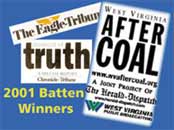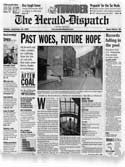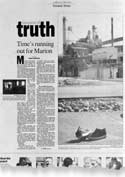Spring 2001
West Virginia Partners Split Top Batten Award
Two Runners-Up Spark Civic Turnarounds
 The Huntington Herald-Dispatch and West Virginia Public Broadcasting swept the 2001 Batten Awards for Excellence in Civic Journalism for ambitious and interactive coverage of the single biggest issue in the state – its future without coal – and the creation of a groundbreaking database of how coal severance taxes are used.
The Huntington Herald-Dispatch and West Virginia Public Broadcasting swept the 2001 Batten Awards for Excellence in Civic Journalism for ambitious and interactive coverage of the single biggest issue in the state – its future without coal – and the creation of a groundbreaking database of how coal severance taxes are used.
Their “West Virginia After Coal” partnership joined two newspaper runners-up: The Eagle-Tribune in Lawrence, MA, and the Chronicle-Tribune in Marion, IN. Both launched in-depth examinations of their troubled communities that sparked encouraging turnaround efforts.
The winners accepted their awards April 19 at the seventh annual Batten Symposium, hosted by Kent State University’s School of Journalism and Mass Communication. This year’s program was titled “Media and Democracy: Civic Journalism in a Digital Age.”
The three top winners shared a $25,000 award, with the West Virginia news organizations splitting $15,000, and the Lawrence and Marion newspapers receiving $5,000 apiece. Five other news organizations won honorable mentions. “This year’s winners demonstrate a striking commitment to reporting on their communities in candid, unvarnished terms and engaging people in finding roadmaps for the future – futures with no easy solutions,” said Jan Schaffer, executive director of the Pew Center for Civic Journalism, which sponsors the awards.
All were characterized by deep community work, a naturalness of the civic engagement and tangible results. “The journalists were very much attuned to the silences in their communities – not just the noise,” Schaffer said. “I think people around the country have no idea how much good work is being done by many of the smaller news organizations,” said Jack Nelson, chief Washington correspondent of the Los Angeles Times and chairman of the Pew Center’s Advisory Board.
The honorable mentions included:
- The Portland (ME) Press Herald for a stunningly framed and written series about teens “On the Verge” of adulthood that broke free of stereotypes.
- St. Paul Pioneer Press for its vibrant and interactive look at how new immigrant communities have painted a “New Face of Minnesota.”
- AOL, Inc. for its fun and informative “Election Guide 2000” that helped engage an apathetic electorate in this year’s presidential elections.
- MTV Networks for three edgy election documentaries that framed issues coverage specifically to engage a young audience.
- Minnesota Public Radio for its multi-layered “The Guinea Pig Kids,” an examination of the state’s proposed graduation standards requirements.
The Top Winner
 The “West Virginia After Coal” project went to extraordinary lengths to involve residents in the need to diversify the state’s economy, using a statewide poll, a six-day newspaper series, ongoing public radio coverage and Web chats. The partners teamed up for a three-hour town meeting that was broadcast live using new digital technology from 10 sites around the state. The Herald-Dispatch created a database that exposed how virtually none of the $18 million coal severance taxes distributed to the state’s 55 counties and 234 municipalities was being used for economic development. Instead, those revenues paid for such things as postage or dog wardens. The reports were offered through the Associated Press to all news media in the state.
The “West Virginia After Coal” project went to extraordinary lengths to involve residents in the need to diversify the state’s economy, using a statewide poll, a six-day newspaper series, ongoing public radio coverage and Web chats. The partners teamed up for a three-hour town meeting that was broadcast live using new digital technology from 10 sites around the state. The Herald-Dispatch created a database that exposed how virtually none of the $18 million coal severance taxes distributed to the state’s 55 counties and 234 municipalities was being used for economic development. Instead, those revenues paid for such things as postage or dog wardens. The reports were offered through the Associated Press to all news media in the state.
 New legislative subcommittees now are considering proposed legislation to target economic development and diversify the economy. There has also been a greater emphasis on workforce training for jobs that will replace mining.
New legislative subcommittees now are considering proposed legislation to target economic development and diversify the economy. There has also been a greater emphasis on workforce training for jobs that will replace mining.
The Runners-Up
 “Unrealized Assets” was The Eagle-Tribune’s effort to bypass a tired master narrative of crime, drugs and political corruption and, instead, brainstorm on how to capitalize on the town’s assets. It aggressively solicited ideas and topics from residents, then focused on 10 assets – examining the pros, cons, benefits and feasibility of such issues as developing the riverfront and the old mills.
“Unrealized Assets” was The Eagle-Tribune’s effort to bypass a tired master narrative of crime, drugs and political corruption and, instead, brainstorm on how to capitalize on the town’s assets. It aggressively solicited ideas and topics from residents, then focused on 10 assets – examining the pros, cons, benefits and feasibility of such issues as developing the riverfront and the old mills.
The project has been a catalyst for change. A new master plan is underway, 50 new police officers are on the street, a fire-gutted old mill is gone, tax incentives now help woo high-tech companies, an arts collaborative has formed and a new group of citizens has stepped up to the plate. The project also helped the newspaper build new ties with its growing Latino community. This led to the recent launch of a Spanish-language weekly.
 “Moment of Truth” was the Chronicle-Tribune’s unflinching 10-month, 120-page effort to “tell the whole story” of its community – not just cover the news. Its staff of 23 full-timers created in-depth reports on a daunting number of Marion’s problems – from high school dropouts to unwed mothers to racial tensions and community leaders who couldn’t get along.
“Moment of Truth” was the Chronicle-Tribune’s unflinching 10-month, 120-page effort to “tell the whole story” of its community – not just cover the news. Its staff of 23 full-timers created in-depth reports on a daunting number of Marion’s problems – from high school dropouts to unwed mothers to racial tensions and community leaders who couldn’t get along.
The newspaper rallied the community and residents are now leading some changes. Indiana Wesleyan University proposed making volunteerism a graduation requirement and partnered with the newspaper in a count of vacant homes and neglected lots. Local residents cleaned up blighted areas, a local businessman donated $50,000 to help build new homes for the needy, the YWCA expanded services to teen mothers, and General Motors joined with the paper in leadership training.
This year’s winners were selected from a record 117 entries. The Batten Awards are named in honor of the late James K. Batten, former CEO of the Knight Ridder newspaper chain. The awards are funded by The Pew Charitable Trusts, based in Philadelphia.
The Judge’s Citations
To The Herald-Dispatch, and West Virginia Public Broadcasting
www.wvaftercoal.org
For “West Virginia After Coal,” an ambitious and interactive effort to engage the entire state in confronting the realities of a declining coal industry. It built multiple entry points and had a strong online component that fostered wide community involvement. It also demonstrated the potential of moving beyond simple publication towards application of the journalism.
To The Eagle-Tribune
For “Unrealized Assets,” an energizing 10-part series that lifted a city’s struggle with crime, drugs and political corruption beyond the realm of hopelessness and into the world of possibilities. It demonstrated a real sense of affection for the community that bypassed boosterism and instead focused on doable solutions.
To the Chronicle-Tribune
For “Moment of Truth,” an unflinchingly honest airing of a larger community narrative that grew out of an embarrassment over a New Year’s Day journalistic convention. The small staff never let the scope of the challenge deter them. Their courage and leadership was inspirational.
James K. Batten Award Honorable Mentions
To the Portland (ME) Press Herald
For “On the Verge,” a fresh and compelling look at teen life that broke free of stereotypes about teens and resisted adult influences. Using pizza parties, disposable cameras and hours of conversations with the teens, it reflected the authenticity of a group of citizens not traditionally covered.
To the St. Paul Pioneer Press
For “The New Face of Minnesota,” a vibrant and interactive chronicle of the immigrant experience in Minnesota. It included polls in five languages and useful things to do, such as book clubs and community discussions in two dozen communities that attracted over 3,000 attendees.
To America Online, Inc.
For its “way cool” Election Guide 2000 one-stop election shopping site with local voter guides organized by ZIP code, polls, virtual candidate debates, issues charts and a “Presidential Matchmaker” that matched voters and candidates on the issues. The guide was done in partnership with CBS News. Twenty million families visited the web site; 165,000 registered to vote.
To MTV Networks
For “I’m a Candidate” and “Choose or Lose 2000:Where were you at 22?” and “Choose or Lose 2000: Sex Laws,” fun and provocative pieces on what the presidential candidates did when they were young, on sexual policy issues and the cost of running for Congress. Done in part with TIME magazine, they modeled how journalism can reach a new generation of news consumers.
To Minnesota Public Radio
For “The Guinea Pig Kids: An Inside Look at Minnesota’s Graduation Standards Experiment,” radio documentaries that used thorough reporting, sophisticated layering of stakeholder voices and an active Web site to produce a conversation that helped delay implementation.
